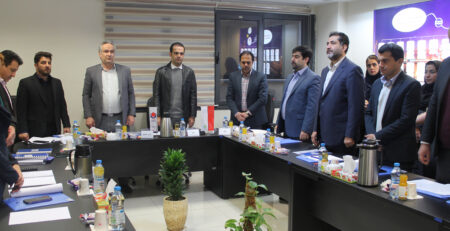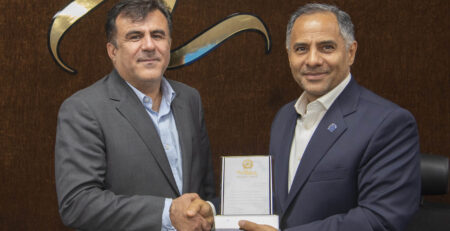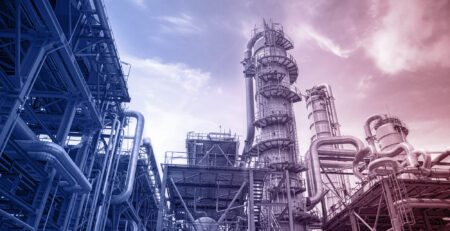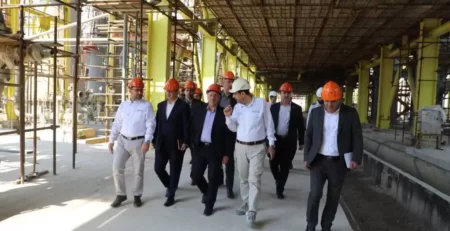The annual general meeting of Sepehr Energy Holding was held on Saturday, 18th Azar 1402 (December 9, 2023), chaired by Alireza Fathi Nia and Secretary Ali Yari, the CEO of this holding, and in the presence of Farhad Jahangiri, Mohammad Zain al-Abidin, and Mehdi Fattahi, members of the board of directors. In this meeting, the CEOs of 6 subsidiaries of Sepehr Energy and senior executives of Petrofarhang and Sepehr Financial Group Export were also present.
According to the public relations report of Sepehr Energy Holding, the CEO and Vice Chairman of the Board of Directors stated in this meeting, presenting the financial report: The production of approximately 796 thousand tons of methanol in the Sabalan Petrochemical Company in the fiscal year ending in 1402, generating nearly $175 million in foreign exchange for the country, was one of the most important initiatives of the year. This production volume was recorded as the highest amount registered in the company, despite numerous challenges such as the non-commitment of the exclusive utility provider in the region, sudden increases in feedstock prices, and simultaneous shutdowns of petrochemical gas due to winter, which deviated many pre-determined plans. In the same year, a 100% increase in production to 1.2 million tons was recorded for Sabalan for the first time. Unfortunately, as the consequence of the aforementioned three issues, this achievement could not be realized. Currently, the production volume in Sabalan exceeds 100%, and in the absence of government inconsistencies, we anticipate the highest level of methanol production in Sabalan for the fiscal year 1403.
Ali Yari continued, saying: The sudden increase in feedstock prices posed a challenge to all petrochemical companies, especially methanol producers. Following this, numerous meetings were held, and various follow-ups were conducted. We engaged in extensive correspondence with the highest-ranking government and state officials because we believe that this issue not only confronts the entire economy of the petrochemical industry but also disrupts the wealth creation for the primary shareholders of this group, who are more than 1 million members of the Cultural Reserve Fund.
He identified the utilization of two petrochemical plants within the next two years as the main goal of the holding, stating: Simultaneously, with the efforts of increasing Sabalan’s production, progress in the two projects of Dena and Siraaf Energy was also diligently pursued. However, due to the non-realization of the budget anticipated from the sale of Sabalan’s methanol for the aforementioned reasons, the expected financial support was not fully achieved. Nevertheless, the Dena project is currently only 19% away from completion, and we hope that with increased support from shareholders, it will be operational by the end of the next year. Additionally, the Siraaf Energy project, with a 59% physical progress in the year 1404, is expected to be completed, bringing the nominal annual methanol production capacity of the Sepehr Energy Group to about 5 million tons.
Yari further addressed the resolution of longstanding issues within the holding, stating: Unfortunately, in past periods, due to factors such as the complexity of legal-litigation cases, there was no determination to address and resolve issues. However, fortunately, in this fiscal year, several major cases were resolved, and many problems were addressed. The agreement with Paydak Company to resolve contractual issues regarding Sabalan and Dena companies, after years as one of the most challenging issues for the holding, has finally been concluded through diligent follow-ups. The determination of the legal status of Sanar Company after 4 years in the Supreme Court of Turkey, obtaining a ruling on the restoration of the legal personality of the company, and the pursuit of the Caris Company case, preventing the freezing of the holding’s accounts amounting to $2.5 million, based on the expert opinion of the board were two other significant cases that were successfully handled by the insight of the board of directors and my colleagues in Sepehr Energy.
The CEO, regarding financial arrangements in Sepehr Energy and its subsidiaries, also mentioned: One of the primary plans of the holding is financial provisioning, in which we have achieved positive results. Obtaining a loan of one trillion rials from the Bank of Eghtesad Novin and initiating the preliminary steps for issuing 150 billion rials of special securities by Siraaf Energy Company from Bank Refah, receiving 15 million euros from the financial resources of the Siraaf Energy Petrochemical Company from the Central Bank, strengthening the mechanism for recovering outstanding claims, collecting a sum of 241 billion rials during the reported year from the recovery of value-added tax credit in Siraaf Energy Company, pursuing the approval of the banking network for a total of 4,500 billion rials in the form of rial facilities and documentary credits in the Dena project, pursuing the issuance of foreign currency restraint certificates for the 20 million euros loan from EIH Bank with the agency of Parsian Bank in the Dena project, and also signing a memorandum of cooperation with City Bank and Refah Workers Bank have been undertaken in this regard. Securing the National Development Fund’s consent for a one-year extension of documentary credit until the conclusion of 1402 and obtaining initial approval for an extension until the end of 1403 at Siraaf Energy Company are among the additional measures implemented in the fiscal year concluding in 1402.
Yari continued, emphasizing support for domestic production as a fundamental principle in the group, stating: As the first holding historically credited with ordering indigenous catalysts, this trend continued last year, and the first 240-ton heavy-duty synthesis gas reactor manufactured in Iran was installed in the Dena Petrochemical. Moreover, Arak Machinery Company executed the construction, delivery, and installation of the ATR (Autothermal Reforming) and Converter 2021-3, along with the construction of Converter equipment -2020-1&2 for the Dena and Siraaf Energy projects during the previous year. The construction and installation processes of Tower-5004 and Tower-5002 in the Siraaf Energy Methanol project were also undertaken by Arak Machinery Company to operationalize this goal within the holding.
He added further: Selling methanol with premiums higher than many Iranian suppliers through SITCO, as the commercial arm of the holding, and the absence of any demurrage payments by this company through effective reservation and chartering of vessels, despite limitations in production and storage, are among the other positive actions taken in this year.
Yari, discussing the strategies devised for venturing into the downstream petrochemical industry, also mentioned: Undertaking initial feasibility studies to enhance the value chain of methanol products into acetic acid at Lavan Chemical Company and concurrently exploring two options: securing approval for gas allocation for the urea and ammonia project or establishing a mini-refinery in Ganaveh Dashtestan Petrochemical Company, are actively on the agenda. The goal is to transform the produced methanol in Sabalan into a higher-value product, aiming for greater foreign exchange earnings for the country.
The CEO of Sepehr Energy stated: In coordination with project-oriented companies and operators in Sepehr Energy, Sepehr Petrochemicals’ Lavan Polar has taken steps towards expanding non-industrial services in the past year. The company aimed to increase its service capacity and also initiated the implementation of a wastewater treatment system to contribute to environmental protection in the region.
The hydrotest of export tanks in Siraaf Energy Petrochemicals, the acquisition of ownership documents by Siraaf Energy after resolving the dispute with the Water Department of Bushehr Province, and the development of the governing-supervisory role of the holding in all aspects of the companies, including planning, financial, human resources, and information technology areas, as well as carrying out legal procedures and final registration of the holding’s capital increase, were among the focal points of the CEO’s report in this meeting.
At the end of this assembly, the financial performance was presented by the independent auditor and legal inspector, and the financial statements for the year 1402 were approved. Furthermore, the general assembly’s approval marked Iran newspaper as the official publication for Sepehr Energy Holding.
With the goal of broadening the Petrofarhang product portfolio:
A technology supply agreement and basic engineering execution agreement were signed by Lavan Chemical Company.
A technology supply agreement, developed basic engineering, and the implementation of the project in the form of LEPCCF were signed between Lavan Chemical Company and Bam Dez Project Company.
The Vice Chairman of the Board of Directors and Acting Head of Lavan Chemical Company announced during the sidelines of the second exclusive Eurasia exhibition about this agreement: In line with realizing the aspirations of the esteemed leadership in preventing crude sales and diversifying Petrofarhang products, as well as achieving the overall policies of the Islamic Republic of Iran, this company signed a memorandum of understanding with Bam Dez Company for technology supply, developed basic engineering, and project implementation in the form of LEPCCF.
Hojatollah Ismaeili, regarding this agreement, stated: This agreement has been concluded to realize the aspirations of the esteemed leadership in preventing crude sales and achieving the development goals of downstream industries, preventing crude sales, and creating added value for the shareholders. This memorandum includes agreements on technology supply, licensing rights, process design, basic engineering, and the construction of the acetic acid plant using the LEPCCF method.
Lavan Chemical Company, one of the priority projects under the Petrofarhang Holding subsidiary, has commenced its operations on a 24.8-hectare plot in Phase 2 of the Pars Energy Special Economic Zone. Upon the project’s completion, the production will encompass 200,000 tons of acetic acid in the initial phase, 100,000 tons of vinyl acetate monomer, and 300,000 tons of synthetic ethanol in the subsequent phase, utilizing methanol and synthesis gas from the region as feedstock.
It is worth mentioning that the National Development Fund has approved facilities for this prominent national project, and the relevant executive stages are currently underway.











